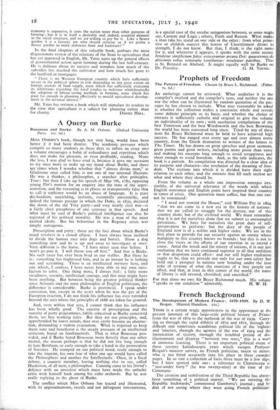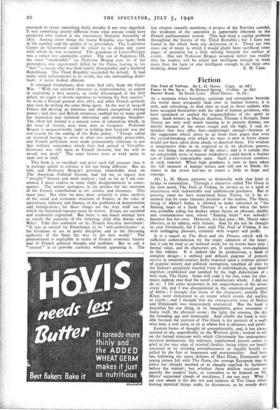French Background
The Development of Modern France : 1870-1939. By D. W. Brogan. (Hamish Hamilton. 21s.)
THERE is a certain tragic appositeness in the appearance at the present juncture of this large-scale political history of France from the war of 1870 to the outbreak of the war of 1939. Carry- ing us through the rapid debacle of 1870 and 1871, through the difficult and sometimes scandalous political life of the 'eighties and 'nineties, through the agonies of the war of 1914 and the intoxication of victory, through the troubled period of dis- illusionment and disarray "between two wars," this is a work of immense learning. There is no important political event of these seventy kaleidoscopic years which escapes Professor Brogan's massive survey, no French politician, major or minor, who is not fitted accurately into his place in these crowded pages. In so vast a collection of facts there must be a few slips, but I have spotted only one : a reference to Clemenceau as "just-under forty" (he was twenty-nine) at the time of the Commune.
The creation and stabilisation of the Third Republic has always
• been something of a political marvel. "We are entering the Republic backwards," commented Gambetta's journal ; and by, dint of not seeing where they were going French politicians
managed to create something fairly durable if not very dignified. It was something utterly different from what anyone could have predicted who looked at the reactionary National Assembly of 1871. Among other things the young Republic was lucky both in the number and the quality of its pretenders. The Legitimist Comte de Chambord could be relied on to damn any cause with which he was associated. The grandson of Louis-Philippe was a rather less unamiable cypher. The son of Napoleon III, the most " marketable " (as Professor Brogan puts it) of the pretenders, was opportunely killed by the Zulus, leaving as his " heir " a cousin who was both faintly disreputable and a declared Republican. The Third Republic succeeded by default. It had many solid achievements to its credit, but one outstanding draw- back : it never looked efficient.
It emerged triumphant, after some bad jolts, from the Great War. "With our national character so impressionable, so ardent in exploiting a first success, so easily discouraged at the first defeat, we ought to devote ourselves to winning the first success." So wrote a French general after 1871, and other French generals may soon be writing the same thing again. In the war of 1914-18 France did develop an immense and almost unexpected staying power ; and time and British resources enabled her to make good her numerical and technical inferiority and strategic blunders. The effort left behind it a natural sense of exhaustion which, in the hour of victory, men were slow to recognise. Professor Brogan is unquestionably right in holding that lassitude was the real reason for thc ending of the Ruhr policy. "Troops called up resented having to serve in what was nominally peace-time, and French politicians were made permanently reluctant to use that military supremacy which they had gained at Versailles. Germany was still open to French invasion, but the will to invade was dead." The same factors were at work again in 1936 and in 1938.
This book is so excellent and gives such full measure that it is perhaps unfair to criticise it for not being different. But its title, and Professor Brogan's previous remarkable work on The American Political System, had led me to expect less " straight " history and more analysis ; and, so far as I am con- cerned, I must confess to some slight disappointment in conse- quence. The author apologises in his .preface for the omission of the French contribution to art, science and literature. This must pass. But what we miss more seriously is some analysis of the social and economic structure of France, of the roles of agriculture, industry and finance of the problems of depopulation and immigration ; for these things are the very stuff out of which the historical tapestry must be woven. Events are narrated and tendencies registered. But there is not much attempt here to satisfy the curiosity of the irritating child who always asks, Why? Take this comment on thz French Socialist movement: "It was as natural for Frenchmen to be 'anti-authoritarian' as for Germans to see in party discipline and in the liberating authority of the State the way to the new world." The phenomenon is explicable in terms of French economic history and of French political thought and tradition. But to call it " natural " is to provoke curiosity without appeasing it. The last chapter casually mentions, a pro pos of the Stavisky scandal, the weakness of the executive as apparently inherent in the French parliamentary system. This had been a capital problem throughout the history of the Third Republic ; but I have not found in the whole book any discussion of it. These are two cases out of many in which I would gladly have sacrificed some pages of narration for a little delving beneath the surface of events. Has not Professor Brogan assumed rather too readily that his readers will be either not intelligent enough to want more than the facts or else intelligent enough to do their own































 Previous page
Previous page